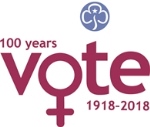‘Girls can make a difference’
Helen Pankhurst is the great-granddaughter of suffragette Emmeline Pankhurst and a women’s rights activist. She shares some practical advice for bringing about change.
 Suffragettes Emmeline and Sylvia Pankhurst are synonymous with the Women’s Movement.
Suffragettes Emmeline and Sylvia Pankhurst are synonymous with the Women’s Movement.
After all, it’s thanks to their inspiring actions that we enjoy many of the rights we do today. Helen (Emmeline's great-granddaughter and Syvia's granddaughter) has followed in their gigantic footsteps, and feels just as strongly about women’s rights as her ancestors did. She believes that there’s only one way to tackle the issues still affecting women and girls: by getting more women into positions of power. We spoke to her about her heritage, what still needs to change and how we can help girls to find their voices – and have them heard.
Did your family legacy inspire you to get involved in social action?
People would notice my surname and, from a young age, I learnt to explain the connection. The more I looked into the history, the more fascinating I found it. I was able to link it to my own experiences, as I grew up in Ethiopia [where Sylvia and her parents had relocated to] and saw many inequalities in the way that women were treated. I moved to England when I was 14 and, in some ways, I saw similar sorts of issues affecting women here. It made me realise that the cause my relatives fought for was still relevant. My surname gave me a voice, and it also gave me power to carry on working for women’s rights.
What can today’s girls learn from the suffragette movement?
Suffragettes changed the law but, importantly, they also changed social attitudes about what women could do. They made women feel they had more control over their lives, and showed that women and girls can make a difference. One example of a young woman who’s truly taken that to heart is school student June Eric-Udorie. When feminism was removed from the A-level politics course, she didn’t just grumble and assume someone else would address it. She campaigned to put it back on the curriculum and, thanks to her petition, it was reinstated.
Which issues do you believe young women should raise their voices for?
Any that they’re passionate about! But one area I believe needs more work is violence against women. While legislation on this has improved dramatically, it is still where the least progress is being made. Twitter abuse, pornography, trafficking and the objectification of women are also major problems.
How do you believe that girls and young women can help to tackle these issues?
Simply by getting more involved in social action. Role models in politics are critical and at least half of MPs should be female, and they should be as diverse and representative of society as possible. I also think it’s sad that there isn’t more political education. But I believe that’s where belonging to organisations like Girlguiding can play a vital role. Guiding is great at growing girls’ skills and confidence, then bringing them together to push for change. Their Girls’ Attitudes Surveys are informing debates on important issues too.
What advice would you give to women who want to bring about change?
For me, change has three strands: political or legal change, changing attitudes, and what individuals do to change the world. I believe the more closely you can knit together these strands, the quicker things can move on. And nowadays, if you get more than 100,000 people to sign a petition, Parliament has to debate it. One example is when Nicola Thorpe spoke out about being forced to wear high heels at work. The issue resonated with others and it led to a debate.
For more insight into the Women’s Movement and advice on social action, look out for Helen’s new book, Deeds not Words. Follow her on Twitter @helenpankhurst
Get involved with Vote 100
Find out how you can get involved in celebrating suffrage and the centenary of the Representation of the People's Act 1918.
Share your story
Have you got a story to tell? We're always keen to hear and share tales of what you've been up to with Girlguiding.